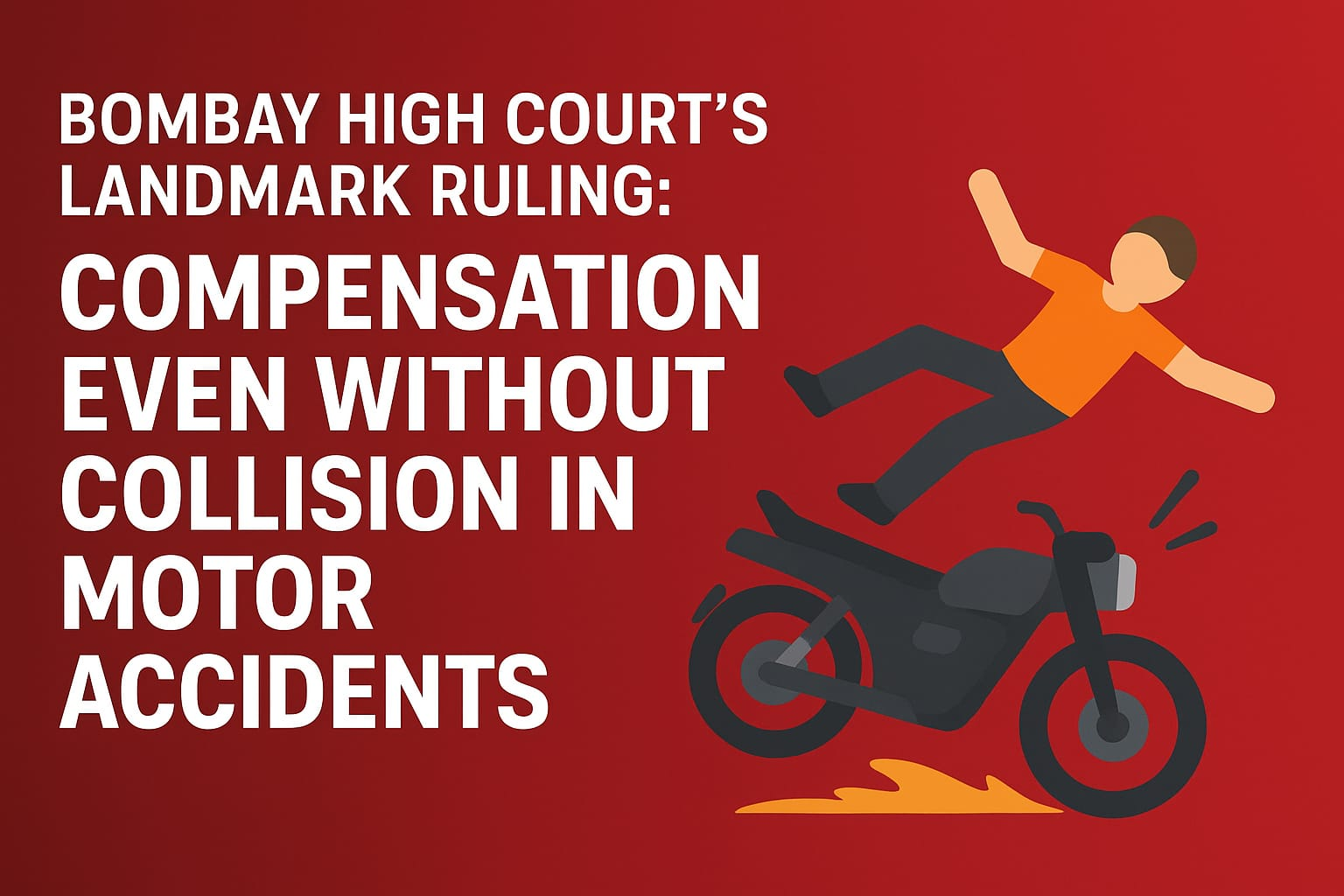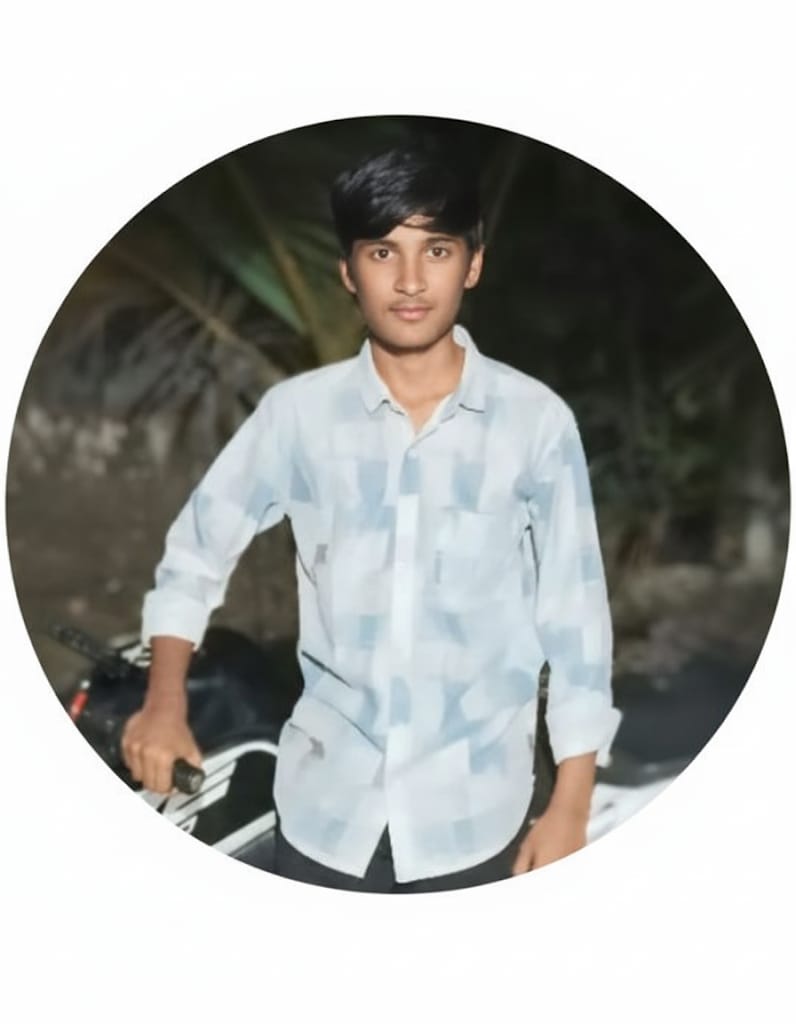Bombay High Court’s Landmark Ruling: Compensation Even Without Collision in Motor Accidents
Introduction
Life is unpredictable. Sometimes, a small and ordinary moment turns into a tragedy that forever changes a family’s future. This is exactly what happened in a village in Kolhapur, Maharashtra, when a simple bike ride turned fatal for a young woman. Her saree got entangled in the wheel of the motorcycle, leading to a slip and fall that caused her death. What followed was not just grief, but also a long legal battle for justice and compensation for her family.
In July 2025, the Bombay High Court delivered an important judgment in this case, clarifying what qualifies as a motor accident, the liability of the insurance company, and the rights of claimants to receive compensation. This case highlights how courts interpret the law to protect families who lose loved ones in tragic accidents.
This blog takes you through the story of the accident, the legal arguments made by both sides, the reasoning of the court, and the final verdict. More importantly, it shows how motor accident claim compensation works in India, and why this judgment matters for ordinary citizens.
Read More :- Courts Cannot Be Used to Extort Money Over Unauthorized Constructions: Delhi High Court
The Case Background
The case was filed as a First Appeal No. 1370 of 2019 before the Bombay High Court, Civil Appellate Jurisdiction. The appellants (claimants) were:
1. Aditya Ramchandra Patil – a 3-year-old boy
2. Pranav Ramchandra Patil – another 3-year-old boy
3. Akkatai Shankar Patil – a 60-year-old woman, the grandmother of the children
They were seeking compensation after the death of the boys’ mother in a tragic accident.
The respondents included:
- Yuvraj Bhivaji Patil – a villager
- The New India Assurance Company Ltd. – the insurer of the motorcycle
- Ramchandra Shankar Patil – husband of the deceased
The case revolved around whether the death of the woman qualified as a motor accident under the law, and whether the insurance company was liable to pay compensation.
The Tragic Accident
On 3rd August 2011, the deceased was riding as a pillion passenger on a motorcycle along with her husband and their two small children. While traveling, a strong wind caused the loose end of her saree to get entangled in the wheel of the bike.
- The wheel jammed.
- The motorcycle skidded.
- All four fell to the ground.
- The woman sustained severe head injuries.
- Despite being rushed to a hospital, she could not survive
This was a tragic household accident, but it raised an important legal question: Was this an “accident” under the Motor Vehicles Act, even though no other vehicle was involved?
Read More :- Wife Rights in Husband’s Property in India | Complete Guide 2025
Tribunal’s Decision – Claim Dismissed
The family initially filed a claim before the Motor Accident Claims Tribunal (MACT), Kolhapur.
- The Tribunal, however, dismissed the case. Its reasoning was:
- The accident happened because the saree got entangled.
- There was no involvement of another vehicle, so it could not be treated as a motor accident.
- Four people were riding on a two-wheeler, which was against traffic rules and a violation of the insurance policy.
- The husband, who was driving, was held negligent.
Because of these factors, the Tribunal concluded that the insurance company was not liable, and only a token amount of ₹50,000 was awarded.
The Family’s Appeal
The claimants appealed to the Bombay High Court, arguing:
1. It was still a motor accident. The Motor Vehicles Act does not require the involvement of another vehicle. Even slipping or skidding qualifies as an accident.
2. The deceased was engaged in a small dairy business, earning around ₹4,000 per month, and her family lost a source of livelihood.
3. The Tribunal’s refusal to treat this as an accident was legally incorrect and unjust.
On the other hand, the Insurance Company argued:
- Carrying four people on the bike was a breach of the insurance policy.
- The accident was caused solely by the saree, not by any external factor.
- Hence, no liability should fall on the insurer.
Read More :- married granddaughter rights on grandfather property
High Court’s Observations
Justice Shivkumar Dige of the Bombay High Court examined the case in detail.
1. What is an “Accident”?
The judge referred to the Lexis Nexis definition of “accident”:
> A sudden, unforeseen, or unexpected event causing harm to a person.
The court clarified:
- Accident includes not only collisions but also overturning or slipping.
- It is not necessary for another vehicle to be involved.
- Hence, the woman’s death due to saree entanglement and fall was indeed an accident.
2. Insurance Policy Coverage
- The bike was insured at the time of the accident.
- A pillion rider was covered under the insurance policy.
- Just because four people were riding did not mean automatic denial of coverage, especially since two were toddlers.
3. Family’s Income Loss
The deceased was supplying milk to a cooperative dairy, earning around ₹3,700–₹4,000 per month.
The court, for calculation purposes, considered her income at ₹2,000 per month with 40% added for future prospects.
Compensation Calculation
The High Court recalculated the compensation using the multiplier method (a standard formula in motor accident claims).
Monthly Income: 2,000
Future Prospects (40%): 800
Total Monthly Income: 2,800
Annual Income: 33,600
Multiplier (18 years): 6,04,800
Additional amounts:
- Consortium (for family members): ₹1,92,000
- Loss of Estate: ₹18,000
- Funeral Expenses: ₹18,000
- Total Compensation: ₹8,32,800
Since the Tribunal had already awarded ₹50,000, the High Court ordered an enhanced compensation of ₹7,82,800 with 7.5% annual interest.
Read More :- NRI Property Sale in Maharashtra – Step-by-Step Legal Guide
Why This Judgment Matters
This case has broader implications for accident victims across India.
Key Takeaways:
1. Accident Definition is Broad
– Even if no other vehicle is involved, slips, skids, or saree entanglements can qualify as motor accidents.
2. Insurance Company Liability
– If the vehicle is insured, the insurer cannot easily escape liability by citing technicalities.
3. Humanitarian Approach by Courts
– The judiciary recognizes the financial and emotional struggles of families after such tragedies.
4. Future Prospects Considered
– Even small earners like dairy workers are valued, and their potential income growth is factored into compensation.
Practical Tips for Families Seeking Accident Compensation
If you ever face a similar situation, here are some steps to strengthen your motor accident compensation claim:
Immediately File a Police Report
Always ensure an FIR is registered. This forms the foundation of your claim.
Collect Medical Records
Hospital records, post-mortem reports, and treatment papers are vital evidence.
Prove Income of the Deceased
Even if the income is from small-scale businesses (like farming, dairy, or self-employment), gather bills, receipts, or testimonies.
Hire a Good Advocate
Motor accident claim cases often involve insurance companies with strong legal teams. A knowledgeable advocate can make all the difference.
Appeal If Needed
If the Tribunal’s order is unfair, families should not hesitate to appeal in the High Court.
Conclusion
This story is a reminder of how fragile life can be. A simple saree, caught in a wheel, changed the lives of an entire family. Two small children lost their mother, a husband lost his wife, and a grandmother had to step in as guardian.
While no amount of money can replace a loved one, fair compensation provides financial stability and justice. The Bombay High Court’s judgment ensured that the family did not leave empty-handed and that the law served its purpose — to protect citizens in times of unexpected tragedy.
As citizens, we must remember that motor accident insurance claims are not mere formalities — they are lifelines for grieving families. This case sets an important precedent, reinforcing the idea that justice should be compassionate, practical, and people-centric.


